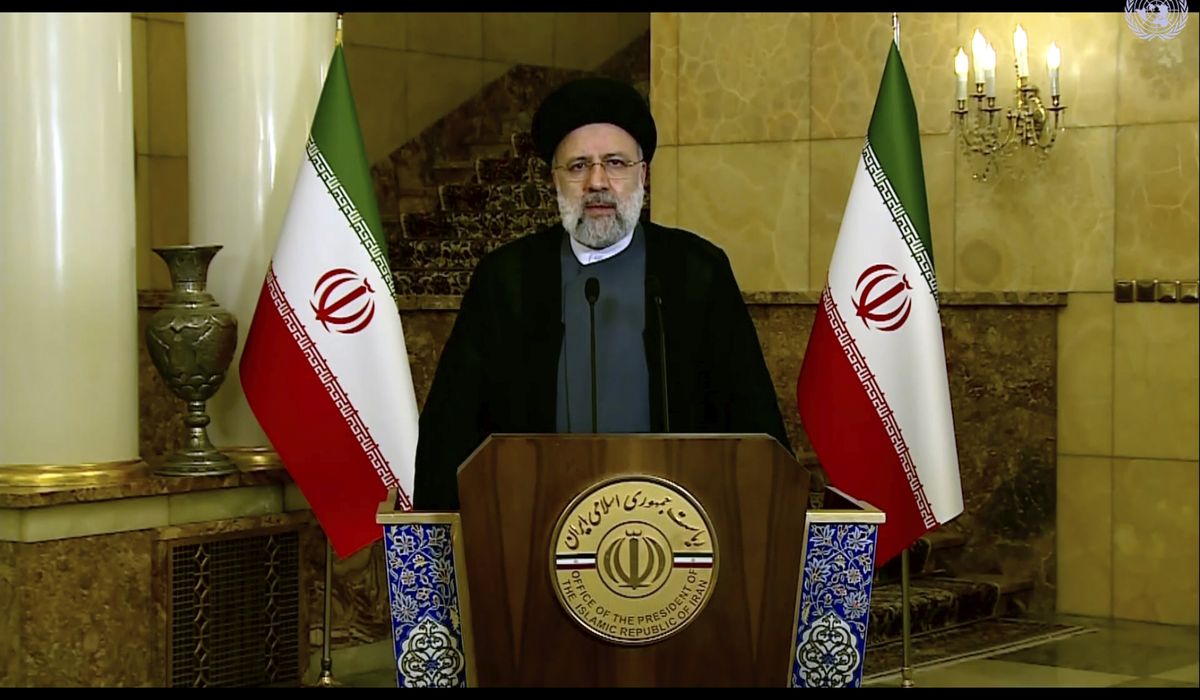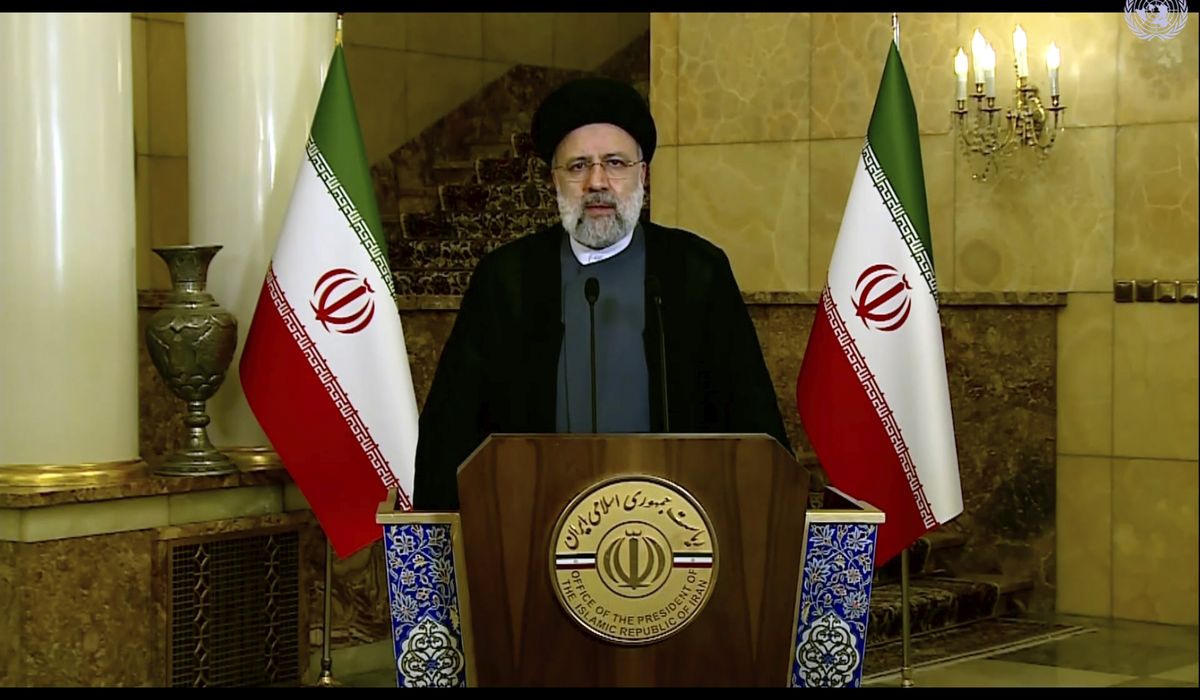
President Biden promised to thaw diplomatic relations with Iran and to resurrect a global nuclear deal shunned by his predecessor, but nine months into his term Mr. Biden has little to show for that effort amid growing signs the administration may have misplayed its hand and created an even bolder, more belligerent regime in Tehran.
Tuesday’s United Nations General Assembly meeting in New York offered fresh evidence of the deep gulf that remains between the two sides and how a massive American diplomatic effort hasn’t moved the needle. In his maiden U.N. speech as president, Mr. Biden held out an olive branch to Tehran and said that the U.S. remains willing to return to the 2015 Joint Comprehensive Plan of Action (JCPOA), which limited Iran‘s nuclear program in exchange for relief from economic sanctions.
But Iranian President Ebrahim Raisi just hours later openly mocked Mr. Biden and his political catchphrase that “America is back” on the world stage. The Iranian leader declared that his country believes it has outmaneuvered Washington and now holds a much stronger hand at the negotiating table.
“The United States mistakenly believed it would render us desperate and devastated, but our perseverance has yielded results,” he said.
A revived Iran nuclear deal was supposed to be a low-hanging diplomatic fruit for Mr. Biden when he took office, with America’s European allies eager to resuscitate the accord. That hasn’t been the case.
Former President Donald Trump pulled out of the JCPOA in 2018 and reimposed economic sanctions as part of his administration’s “maximum-pressure campaign” against Iran and its trading partners. The moves caused widespread economic hardship in Iran, but U.S. hopes that Iran‘s theocratic leaders would be more ready to cut a deal did not pan out.
Mr. Biden quickly abandoned that approach and said the U.S. would lift sanctions and return to the JCPOA if Iran met its obligations by limiting uranium enrichment at its suspect nuclear facilities.
The administration over the summer even lifted some sanctions on former Iranian officials and companies in what was intended to be a first step toward a new nuclear deal.
But analysts say Mr. Biden has badly misread the situation. A chance to cut a deal with outgoing moderate President Hassan Rouhani, a strong supporter of the 2015 deal, came and went with Iran‘s summer presidential elections. Hard-liners helped engineer the election of Mr. Raisi, who has no personal or political investment in the deal.
Mr. Raisi‘s confident comments Tuesday, they say, reflect a school of thought inside Tehran that the U.S. lacks real leverage and is running out of cards to play.
The president, Secretary of State Antony Blinken and other top officials seem to have assumed that Iran would be willing to make major concessions — such as immediately rolling back uranium enrichment levels or cutting funding to terrorist groups and militias that routinely target U.S. troops in the Middle East — when presented with a real opportunity to make a new deal with a less aggressive America and ease Tehran‘s isolation in the region and in the world economy.
Timing the concessions needed on both sides also has proven problematic: Iranians argue that it was Washington that reneged on the deal and should be the first to drop sanctions. Burned by Mr. Trump, they also are seeking a guarantee from Mr. Biden‘s team that the sanctions won’t be reimposed by a future American administration, a pledge the U.S. side says it cannot make.
And with shaky support on Capitol Hill, the Biden administration is loath to make a major concession first without a corresponding offer from Tehran.
Leverage
Some analysts say that Iran believes it has more bargaining power than ever, having learned to live with the U.S. economic sanctions and confident that there is virtually no chance Mr. Biden will return to the hard-line policies of Mr. Trump and that the Biden White House is unwilling to get tough.
“There is a perception in Iran that Washington isn’t going back to that anytime soon,” said Behnam Ben Taleblu, senior fellow at the Washington-based think tank Foundation For Defense of Democracies who closely tracks U.S.-Iran relations. “These are people who want to rub America’s nose in the dirt. If they have survived what they believe is the peak of pressure, why would they want to meet the Biden administration’s 180 on Iran policy with a 180 on their America policy? If anything, they believe they have been dealt the high road.
“Time is a weapon. And the victor in this escalation spiral is going to be the one who is able to weaponize it better,” he said.
Behind the scenes, administration officials in recent weeks have expressed deep frustration with the inability to reach a new agreement with Iran despite a string of indirect bargaining sessions in Geneva that kicked off shortly after Mr. Biden became president.
Even in public, Mr. Blinken this month admitted that “we are getting closer” to a time when it no longer makes sense to expend diplomatic and military capital to revive the 2015 deal, which was negotiated when Mr. Biden was vice president under President Obama.
Failure to reinstate that deal would mark another major foreign policy misstep for the Biden administration, which is already reeling from its bungled military withdrawal from Afghanistan.
For his part, Mr. Biden stuck by his position Tuesday that a deal can still be struck.
“The United States remains committed to preventing Iran from gaining a nuclear weapon,” he said during his speech at the U.N. “We are working with [international allies] to engage Iran diplomatically and to seek a return to the JCPOA. We’re prepared to return to full compliance if Iran does the same.”
The JCPOA also was signed by Britain, France, Germany, Russia and China, all of which continue to support it. Those countries have taken the formal lead in talks with Iranian officials in Vienna in recent months. Having pulled out of the deal under Mr. Trump, the U.S. has played an indirect role in the negotiations and has not officially had one-on-one talks with the Iranians, though it’s clear the two camps regularly communicate with one another.
All sides indicated Tuesday a desire to return to the negotiating table. But Tuesday’s address by Mr. Raisi, the hard-line Iranian president who assumed office just last month, gave little indication that Tehran is prepared to compromise at all.
“Today, the world doesn’t care about ‘America first’ or ‘America is back,’” he said, mocking the political slogans used by both Mr. Trump and Mr. Biden.
“I, on behalf of the Iranian nation and millions of refugees hosted by my country, would like to condemn the continued illegal U.S. sanctions” on Iran, Mr. Raisi said. “The United States has not yet discharged its obligation, which is lifting sanctions. It has encroached upon the agreement, withdrawn from it, and levied even more sanctions on my people.
“We don’t trust the promises made by the U.S. government,” he added.
Back in Washington, powerful Republicans say it’s now clear the Biden administration’s approach has been a failure.
Mr. Biden‘s “eagerness to return to the flawed nuclear deal is only encouraging Iran’s nuclear provocations,” said Rep. Michael McCaul, the top Republican on the House Foreign Affairs Committee.








